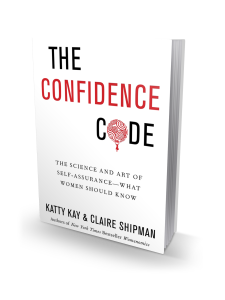In their book, The Confidence Code, Claire Shipman and Katty Kay counsel against the popular advice to “fake it ‘til you make it”. They tell us that “Confidence isn’t about pretending, or putting on an act; it springs from genuine accomplishment and work.”[1]
They also go on to say that faking confidence actually makes us feel less secure, and that others will certainly be able to detect the false signals we’re sending.
Let’s deal with these last two points first, and then come back to the first.
There is an entire body of research around what’s called “embodied cognition”, which means that our minds sometimes take cues from our body to determine how we should feel. In a nutshell, adopting a confident pose even when we don’t feel it can actually make us feel more confident.[2]
Will others be able to tell if we feel less confidence than we try to show? It’s not as easy as you might fear. We all think we’re better at detecting deception than we actually are, but one survey of over 200 studies found that people perform only slightly better than chance at detecting when others are not being totally truthful[3]. Even specialized training doesn’t help much, as the Transportation Security Administration found out after spending over $1 billion to train its “behavior detection officers”, with little to show for it.[4] You will probably be the only person in the room who knows the true level of confidence you’re feeling.
The first point is worth addressing at length. It’s true that confidence should ultimately rest on a solid foundation of real competence and compelling content, and in business presentations and sales, outright lying is not only wrong but it’s also stupid. But the problem is that you can have a strong conviction that you are right and still feel a lack of confidence in your ability to get others to buy into your point of view, or you may have pre-speech jitters despite your solid grasp of your material. In cases like that, it does not help your case to be open about your lack of confidence.
In fact, there are often times that faking confidence is not only acceptable, it’s the only right thing to do.
The outstanding historical example of “fake it ‘til you make it” was when Winston Churchill inspired a nation and possibly even deterred another by telling the world that “We shall fight on the beaches, we shall fight on the landing grounds, we shall fight in the fields and in the streets, we shall fight in the hills; we shall never surrender.” After he closed the speech, he remarked to colleagues, “We shall hit them over the head with broken bottles, because that’s bloody well all we’ve got.”
Churchill did not sugarcoat the grim military situation in the beginning of his speech, but he knew that he had to say something to inspire his countrymen for the hard road ahead. He knew that Britain could eventually resupply itself with weapons, but the one indispensable asset that had to be preserved at all costs was confidence. If he showed any wavering at all, the consequences could have been disastrous.
Does a coach tell his team during a halftime speech that he doesn’t think they can come from behind, because the other team is too good? Does a doctor tell a patient that she doesn’t have confidence that the procedure will work? In situations like this, faking confidence is not only acceptable, it’s the right thing to do for the other party.
There are also times when faking confidence is the right thing to do for your own interests. When you’re in a negotiation, do you openly admit that you’re desperate for the deal, and will cave in if they object?
Life will constantly throw situations at you where you will need to show more confidence than you actually feel; people will not follow an uncertain trumpet. Sometimes you do have to fake it ‘til you make it. It’s called leadership.
[1] P. 164.
[2] Amy J.C. Cuddy and Caroline A. Wilmuth, The Benefit of Power Posing Before a High-Stakes Social Evaluation, Harvard Business School Working Paper, 2012.
[3] Charles F. Bond and Bella M. DePaulo, Accuracy of Deception Judgments, Personality and Social Psychology Review, 2006.
[4] I’m still waiting to land one of those training contracts.





